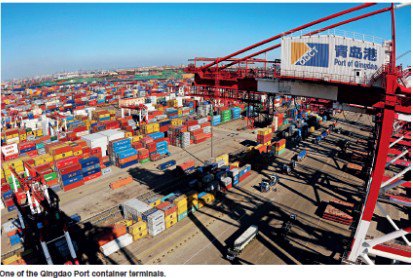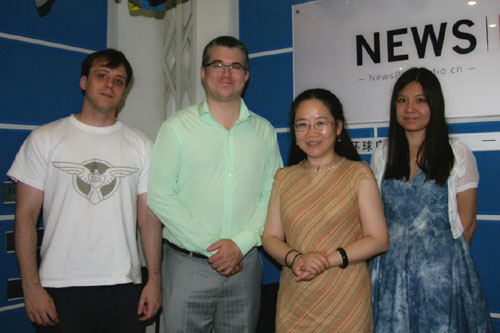 Recently, zhaopin.com released the Chinese Staff Psychological Health Report for 2013. Being over stressed has already become a common mental status for employees in China. As people are under huge pressure in the workplace, other symptoms are appearing, such as depression and anxiety. So the dropping level of happiness in the workplace has drawn people’s attention.
Today, joining us in the studio is Robert Parkinson, the CEO and Founder of RMG Selection, an international HR services organization focused on the Chinese market. He has over 14 years of international recruitment and selection experience, and has worked in Asia, Europe and North America. Mr. Robert Parkinson, thank you for joining us
Listening to the original link please click at: http://english.cri.cn/7146/2014/06/19/3181s832455.htm
Recently, zhaopin.com released the Chinese Staff Psychological Health Report for 2013. Being over stressed has already become a common mental status for employees in China. As people are under huge pressure in the workplace, other symptoms are appearing, such as depression and anxiety. So the dropping level of happiness in the workplace has drawn people’s attention.
Today, joining us in the studio is Robert Parkinson, the CEO and Founder of RMG Selection, an international HR services organization focused on the Chinese market. He has over 14 years of international recruitment and selection experience, and has worked in Asia, Europe and North America. Mr. Robert Parkinson, thank you for joining us
Listening to the original link please click at: http://english.cri.cn/7146/2014/06/19/3181s832455.htm
Tag Archives: RMG Selection
Staff Psychological Health Report released
- Monday, 23 June 2014 02:36
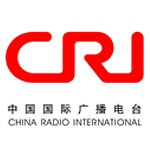
 Recently, zhaopin.com released the Chinese Staff Psychological Health Report for 2013. Being over stressed has already become a common mental status for employees in China. As people are under huge pressure in the workplace, other symptoms are appearing, such as depression and anxiety. So the dropping level of happiness in the workplace has drawn people’s attention.
Today, joining us in the studio is Robert Parkinson, the CEO and Founder of RMG Selection, an international HR services organization focused on the Chinese market. He has over 14 years of international recruitment and selection experience, and has worked in Asia, Europe and North America. Mr. Robert Parkinson, thank you for joining us
Listening to the original link please click at: http://english.cri.cn/7146/2014/06/19/3181s832455.htm
Recently, zhaopin.com released the Chinese Staff Psychological Health Report for 2013. Being over stressed has already become a common mental status for employees in China. As people are under huge pressure in the workplace, other symptoms are appearing, such as depression and anxiety. So the dropping level of happiness in the workplace has drawn people’s attention.
Today, joining us in the studio is Robert Parkinson, the CEO and Founder of RMG Selection, an international HR services organization focused on the Chinese market. He has over 14 years of international recruitment and selection experience, and has worked in Asia, Europe and North America. Mr. Robert Parkinson, thank you for joining us
Listening to the original link please click at: http://english.cri.cn/7146/2014/06/19/3181s832455.htm
China’s Smog Splits Expatriate Families as Companies Pay for Fresh Air
- Thursday, 10 April 2014 03:07


As a thick smog hung over Beijing last year, Stephanie Giambruno and her husband decided it was time for her and their two girls to return to the U.S.
Giambruno’s husband stayed back in China for his job as general manager of a global technology company. He now skypes with the family twice a day and lives with “constant jet lag” as he travels to Florida once a month to see them, she says.
While it’s hard to be apart, Giambruno says Beijing’s record air pollution left them no choice. She saw friends’ children develop asthma. Their own daughters, at age 6 and 21 months, were often forced to remain indoors.
“It’s not a way to live, to keep your baby inside with an air filter running,” she said.
As bad air chokes Chinese cities, some expatriates are starting to leave families in their home countries, the latest sign of pollution’s rising cost to the more than half-a-million foreigners working in China and the multinationals seeking to retain them. Smog in Beijing was worse than government standards most days last year, and environment ministry statistics show that 71 of 74 Chinese cities failed to meet air-quality standards.
The World Health Organization said in March that air pollution contributed to 7 million deaths worldwide in 2012 — with 40 percent of those coming from the region dominated by China under the WHO’s classification system. Outdoor air pollution can cause lung cancer, a WHO agency said last year, ranking it as a carcinogen for the first time.
Hardship Packages
“We are seeing some companies reverting to 1980s and 1990s hardship packages for executive-level candidates in cities that are hard hit with pollution,” said Angie Eagan, managing director for China at recruitment firm MRIC, in an e-mail. “These packages are shaped around executives leaving their families in their home country and receiving an allowance for frequent home trips.”
China’s Bad Air Day
Japan’s Panasonic Corp. (6752) is considering increasing a living allowance for overseas workers in China by an undisclosed amount based on environmental factors, including air pollution.
Some companies remain reluctant to add to the 5 percent to 10 percent premium they already pay to foreign employees in China, preferring to compensate them for pollution through perks such as more time off, paid trips to get away or covering the cost of insulating homes from bad air, said Fred Schlomann, managing director at human resources advisory firm AIRINC.
A third of European Union Chamber of Commerce companies in China said air pollution has added to human-resource costs as expats make demands such as better health care, pay or air filters, according to Ioana Kraft, general manager of the chamber’s Shanghai chapter.
Top Challenge
Two-thirds identify air quality as the top challenge in attracting foreign talent. About 48 percent of respondents to a survey in 2014 by the American Chamber of Commerce for Beijing and Northeastern China said they had difficulties recruiting or retaining senior executives in China due to the pollution.
James McGregor, Greater China chairman of consultancy APCO, is moving to Shanghai in May after being in Beijing for 25 years and says his wife spends more time in Minnesota now, partly due to the pollution. To provide a clean work place, his firm installed air filters every 25 feet (7.6 meters) in their Beijing office, about a dozen devices for 30 staff members. Even so, employees need more medical leave than 18 months ago.
“There are a lot of sick days, and sometimes our office in Beijing sounds like tuberculosis wards,” McGregor, 60, said. “People in our office are complaining they don’t feel good, they don’t have energy.”
Hazardous Levels
Levels of PM2.5, the tiny particles posing the greatest risk to human health, were stuck at hazardous levels for a week this year in Beijing and peaked at 35 times the WHO’s recommended limit in 2013. McGregor’s firm is able to retain staff because it mostly hires locally. Even so, he’s hearing from some clients that it’s getting harder draw new talent.
“We’re starting to see families don’t come,” McGregor said. “In some cases, people are coming without their families and they are cutting a deal to go home more often.”
R. Shane McNamara, an American executive who runs a 15-person interior design and construction company in China with his wife, says she is mulling moving her home base to Hong Kong due to the pollution. His wife, who is Chinese, has cut back on work travel because of the bad air, he said.
While McNamara says he would stay back on the mainland for the business, he has his own health concerns. At his annual health check up at the Mayo Clinic in the U.S., the doctor told him that “absolutely with that kind of pollution his health would be impacted.”
‘Talented People’
“Talented people have actually talked to me, and they’ve changed their decision to settle in China because of the air pollution,” WHO Director-General Margaret Chan said in a March interview with Bloomberg TV. “I think Chinese authorities understand this and they know what’s going on.”
Simon Gleave, Beijing-based partner in charge of KPMG’s Asia-Pacific Financial Services Practice, has spent $4,000 for an air-quality monitor, $15,000 for air filters around the house and has an indoor virtual-reality biking system for days when the air is too bad for him to cycle outside.
“If my daughter develops any health effects though, we would leave immediately,” said Gleave, who has lived in Beijing for more than a decade.
Pollution is making it hard for Nestle SA to draw both foreign and Chinese talent to Beijing, said Greater China Chairman Roland Decorvet.
War on Smog
Chinese Premier Li Keqiang has called pollution a major problem and said the government will declare war on smog by removing high-emission cars from the road and closing coal-fired furnaces.
Almost two-thirds of the country’s wealthy, those with assets of $1.6 million or more, have left or plan to leave the country, according to the Hurun Report, a Shanghai-based research firm which tracks the country’s wealthy. Environmental concerns is one of their most frequently cited reasons, according to Kristin Shi-Kupfer, who researches Chinese society at the Berlin-based Mercator Institute for China Studies.
Companies from Nestle to Japan’s Sony Corp. (6758) are handing out masks to employees in China. Some are lining their offices with air filters, or hiring experts to coach executives on battling smog. Qoros Auto Co., a joint venture between an Israeli company and China’s Chery Automobile Co., said it spent about 150,000 yuan ($24,000) for purifiers at its offices and 9,750 yuan on masks for employees.
Air Purifiers
Chris Buckley, a distributor of the Blueair brand of purifiers in Beijing, says corporate demand for air purifiers has doubled over the past year. Company orders could be in the range of $100,000 to fit out a two-floor office, while mid-to upper-level corporate executives can get allowances of about 15,000 yuan to 20,000 yuan to offset costs of their home purifiers, he said.
Gordon Peters, a doctor who spent more than 30 years in the U.S. Air Force and is now the Beijing-based North Asia medical director for risk advisory firm International SOS, says more corporates are hiring for seminars on protecting themselves from air pollution.
He lectures on checking pollution apps before leaving the house, which face masks to wear (N95 as it keeps out 95 percent of pollutants), the importance of air purifiers and how to seal windows and doors.
While pollution is seen as a hindrance, companies are still able to attract expats because deep knowledge of the China market is becoming crucial to career and business advancement.
‘Whole Meal’
Robert Parkinson from the U.K, who owns a 40-person executive search firm in Beijing, just spent more than $6,000 on two purifiers for his office. While he acknowledges the pressures from pollution, he doesn’t see it as a reason to leave because China offers advantages such as career experience, cultural exposure and good expat benefits, he said. “You have to take China as a whole meal, it’s part of the experience,” he said.
Giambruno, who moved with her girls to Florida, is grateful for the clean air they now have. While the distance and global commute are a tough cost to her and her husband, “that’s where his job is right now, and he’s got a great job and works for a great company,” she said, declining to comment on his compensation or specifics of his job.
Even as Giambruno recalls things she loved about Beijing, where she worked as a freelance television producer, she also remembers outings canceled as pollution spiked and smog so thick one January day that you could almost touch it. Now, she appreciates Florida’s blue skies.
“Every time I walk outside with the girls, I say ‘breathe in,’ because it’s the most amazing smell — fresh air.”
Read the original article on Bloomberg: http://www.bloomberg.com/news/2014-04-07/china-s-smog-splits-families-as-toxic-pollution-extracts-costs.html
Panasonic offers China workers pollution compensation — RMG CEO quoted in the Financial Times
- Thursday, 13 March 2014 06:19

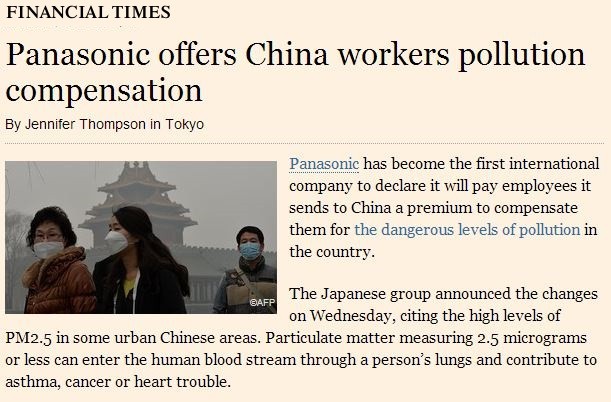
Panasonic has become the first international company to declare it will pay employees it sends to China a premium to compensate them for the dangerous levels of pollution in the country.
The Japanese group announced the changes on Wednesday, citing the high levels of PM2.5 in some urban Chinese areas. Particulate matter measuring 2.5 micrograms or less can enter the human blood stream through a person’s lungs and contribute to asthma, cancer or heart trouble.
Employees sent to China by Panasonic typically receive a more generous remuneration package because it is classed as a “hardship posting”, but until now no explicit mention has been made of growing concern over the dire air quality in the country.
Unrelenting smog has become a focus for public discontent, particularly in prosperous urban areas such as Beijing, which in February experiences a week-long stretch of “hazardous” air, the worst level on China’s air quality index. It has also been cited by expatriates as one of the main reasons for leaving the country.
The company did not disclose the number of Japanese employees in China covered by the scheme or the amount they will receive. Chinese employees already living in the country will not receive the extra payment.
Other companies have been quietly increasing the benefits they offer to expat staff over the past year but Panasonic is the first to publicly acknowledge the problem and offer an allowance to compensate employees who agree to relocate to China.
“That’s the first time I’ve heard any company be quite so brazen about it,” said Robert Parkinson, head of Beijing-based recruiter RMG Selection. “The normal style would be to dress it up as a ‘developing country allowance’.
“It’s a bit like saying we know we are exposing you to something that could be life-threatening. We’re going to admit it and compensate you for it.”
At the opening of China’s parliament last week, Premier Li Keqiang said his government would wage “war on pollution”. Days later an official analysis of 74 Chinese cities revealed that only three met national air quality standards.
The issue has gained more international attention since 2008 when the US embassy installed a pollution monitoring system on its roof in Beijing to detect the level of PM2.5.
The government has made some efforts to clean up polluting factories and steel mills and has also pledged to try and limit the number of cars on the country’s roads. Last year it outlined a plan to cut emissions and polluting steel capacity in the populous east, but attempts to regulate pollution are difficult given the country’s reliance on coal burning.
For many expatriates the extreme levels of pollution and its impact on daily life have already convinced them to leave. Many western embassies in Beijing started providing air filtering machines for their diplomats in 2014 as it became increasingly difficult to convince qualified people, especially those with small children, to move to the Chinese capital.
Article shared from FT page: http://www.ft.com/intl/cms/s/0/9567823e-a9b3-11e3-adab-00144feab7de.html#axzz2vou41nWU
Day breaks in china’s logistics industry
- Monday, 17 February 2014 07:28

MENTION logistics, and perhaps a busy port comes to mind. We may then recall how Rotterdam was unarguably once the world’s busiest port, for 40 years. Yet, in just a few years this logistical crown was usurped by Singapore, among the most thriving of countries in Asia. How is the logistic industry going on in the Chinese market? Find out in Ruben’s latest article published on China Today “Day Breaks in China’s Logistics Industry”!
The term “logistics” was first coined in 1927 by U.S. scholar Ralph Borsodi. Yet logistics services actually originated in military usage, and logistics has since come to play a major role in today’s global supply chain. Among all types of logistic services, however, third-party logistics (TPL) first started in the 1980s in the United States. This business expanded by 20 percent each year over the following 20 years. And then TPL in the European countries swiftly came up from behind.
The world was, to a large extent, then soon surprised by the rapid development of the logistics industry in China. Though the industry was exposed to a negative economic environment from 2008 to 2009, during which the world suffered the financial crisis outbreak, it was somehow a wakeup call for international logistic companies, to the fact that Asia, or more specifically China, is where the future of the industry lies.
What’s going on in the industry in Europe and the U.S.A., as compared to China’s current TPL development? There are apparently many differences.
Enormous Investment in an Emerging Industry
In terms of logistics infrastructure, since most business is done through ocean freight, differences may be illustrated by comparing the amount of investment in port infrastructure in China and Europe. After China officially became a WTO member in 2001, international TPL rushed into the Chinese market. A huge investment in China’s TPL has since been evident. In the year 2002, there were only about 10,600 quay berths, yet by 2011-2012, they had almost tripled to 31,000 (2013-2017 China Port Logistic Industry Analysis and Prediction Report data). The amount of investment has continued to increase each year. For example, after gaining great rewards in 2011, the Logistics Management Department of Liaoning Province decided to invest RMB 20 billion in port infrastructure in 2012.
Since Europe became involved in the logistics business earlier than Asian countries, as regards both infrastructure and operation of the logistics industry, European countries have achieved greater maturity. Their investment should therefore not increase as rapidly as in China. However, through specific investment in either channels or bridges to solve small problems, certain cities like Hamburg and Antwerp are still among their greatest ports in Europe. Moreover, investment in further development never stops in Europe. Rotterdam, as the best port in Europe, absorbed €10 billion (about RMB 80 billion) in investment from government and corporations from 2006 to 2013. And despite being the best in Europe, development of this port has never stopped.
Toward Lower GDP Costs
Observing the logistics costs in percentage terms of GDP in China and in some developed countries, we see there is still much to improve in China’s logistic systems. Logistics costs refer to the costs of transporting and storing products, as linked with charges for transportation methods including train, truck, air and ocean transport. Other logistics costs include fuel, warehousing space, packaging, tariffs and duties.
In 2011-2012, logistics industry costs as percentage of GDP were: U.S.A. – 10.5 percent, UK – 10.6 percent, Netherlands – 11.3 percent, and Japan – 11.4 percent. In 2011-2012 in China, logistics industry costs as a percentage of GDP was about 18 percent – 8 percent higher than in developed countries (China Logistics Club data). Further explanation is required here: lowering such costs as a percentage of GDP is more profitable for businesses. This is because logistics services do not add value to the process. To be specific, the faster and more efficient you are, the more money you make during the process. Unfortunately, an increasing number of logistics companies in China are still struggling for higher profits.
Yet, it is worth mentioning the case of Qingdao, a city doing so well in logistics that it sets a good example for other cities in China. In 2008, the cost of logistics in Qingdao was only 9.8 percent of GDP, comparable to developed countries. The city mainly developed its port, supplementing airfreight and rail transport. It has thus focused on its specialty – ocean freight. In this regard, reduction of logistics costs requires companies to specifically focus on an industry and offer proper logistics services at the same time.
Clear Norms and Standards Required
There is a famous saying among the Chinese, “Nothing is accomplished without norms and standards.” This works in the logistics industry, too. Logistics management standardization refers to national regulations and standards in the industry, the assortment of types and sizes of companies, the business process, and so forth. To manage an industry well, to a large extent, entails a well-established management system.
The United States was the first country in the world to organize a national logistics management department – the National Council of Logistics Management (CLM). In the 1980s, rules and regulations (around 1,200 terms) were drafted for airways, waterways, railways and highways, which ensured the quality of logistics services in the country. It is the same in Europe. DHL, Kuehne & Nagel, DSV, Panalpina, CEVA – all these companies are excellent performers in the market. The key reason is that people know what they are doing every day and why they do what they do. Everyone is clear about standards and norms.
As for Chinese logistics standards, of course companies must follow rules from the Ministry of Commerce, the Ministry of Transport, and the General Administration of Customs. However, these are all very general rules. And although there are local logistics organizations in China, for example, the China International Freight Forwarders Association being one of the biggest, such organizations have yet to devise specific rules. There are thus no detailed rules and regulations for Chinese logistics companies to follow.
In this regard, I have two sets of advice for Chinese logistic organizations. Firstly, I would recommend that Chinese logistics organizations, especially local ones, cooperate with each other by holding events and networking activities. In this way, logistics organizational networks would expand effectively. Through merging local logistics organizations toward a larger scale, amalgamation could approach the level of international logistics organizations. Another point is to increase standards for companies wishing to join logistics organizations. Normally companies who are members of the organization are given logistics certificates. I think if China divides the certification system into the three levels of basic, good and excellent, some truly fine logistic companies would be more willing to join such organizations.
Market Segmentation
As client needs may vary quite significantly, logistics services could be divided into many types: by industry, geographic region, product, clientele, time duration, service, and interest return. In freight forwarding, for example, the basic service is transport from port to port. Other companies offer added-value services – transport from door to door. The market is thus based on service type. Market segmentation among big international companies in Europe is fully developed. They offer services for ocean imports and exports, containers, contract logistics, and so forth. Customized services have become one of the core ideas for running businesses in today’s world. Moreover, there are logistics companies offering services to only one or a few select industries, such as in automotive and consumer products, or chemicals.
Development in China’s logistics market segmentation is still at entry level. At the beginning, a lot of logistic companies provide the same services. Problems appear at a later stage when profits begin decreasing at a rapid rate. Companies, therefore, have to think about how to make the pie bigger before getting their slice. A few of the better logistic companies, such as COSCO Logistics and CNPL, are performing well through the market segmentation process, based on geographic region, industry type, as well as the size of client companies.
The point of comparing the industry in China to that in Western countries is not to let everyone down. Though there are disadvantages for China right now, with the above improvements, business will get better sooner or later. There is no doubt that, during the past decade, the development of the logistics industry has been amazing.
When the Netherlands was still king of the logistics industry, Asian ports and logistics companies were left far behind. China took but a few years to catch up, and then take the lead. With the country’s rapid economic growth, I am confident that China will unleash a logistics industry gold-rush in the near future. RUBEN VAN DEN BOER is RMG Selection consultant.
HR Attention – China Logistics Talent under The Spotlight
- Friday, 14 February 2014 07:24
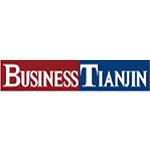

Do you know that logistic industry is in the shortage of talent? Find out the answer in Robert Parkinson’s article on Business Tianjin. As the development of economic globalization and the rise of the network economy move ahead quickly, global logistics services start to accelerate development. Because of logistic employee shortages, this sector is now one of the top 12 talent shortage industries! For human resource professionals, have you started to consider how to attract qualified logistics talent to stimulate business development? Come and read the insights from Robert!
As the development of economic globalisation and the rise of the network economy move ahead quickly, global logistics services start to accelerate development. Because of logistic employee shortages, this sector is now one of the top 12 talent shortage industries. Therefore, human resource managers should pay closer attention to hiring qualified staff and maintain current logistics talents.
It is common knowledge that the modem logistics is the integration of transport, warehousing and information industry, the service industry is an essential part of the national economy. In the transportation, storage, packaging, distribution processing, information handling and other aspects of company operations, each step demands a large number of personnel involvement. The demand for logistics talent is forecasted to increase by 400,000 per year in the 12th Five-Year Plan (2011-2015). However, the number of logistics graduates is only 4 million per year, which cannot satisfy the high demand. Furthermore, the educational qualifications of current logistics staff are much lower than the average standards of other industries.
As a human resource manager, you should start to consider how to attract qualified logistics talent to stimulate business development. Before planning a strategy of logistic staff recruitment, you should clearly understand the meaning of logistics talent first. Logistics operations not only require talented individuals, they also need to hire sales people, purchasing people, and supply chain management personnel.
Sales People
Rather than merely looking at the candidate’s current shipments, companies should recruit sales people fitting their own strengths and weaknesses, in order to utilise the strengths to overcome the weaknesses and to take advantage of the opportunity to avoid the threats. Companies should realise that only a small proportion of sales person are actually qualified for their business niches. Consequently, it becomes incrementally important to have the selling point ready to attract those truly value adding sales people.
Purchasing Personnel
Since procurement is becoming increasingly important in the company’s strategy, it is an essential component of a firm’s supply chain in order to gain market share in the intense competition. Nowadays, procurement is becoming more diversified, multinational, and interdepartmental. The procurement officers need to have good foreign language communication skills, and have an acute sense of influencing factors such as fluctuations in raw material prices and climatic changes.
Supply Chain Management Personnel
The competition has been changed from being primarily amongst companies or amongst regions to being amongst supply chains. China has becoming the world’s manufacturing base, and numerous enterprises have realised that supply chain management is the key link to produce excellent firms. Meanwhile, the supply chain integrates the information system of enterprise, which means that the supply chain managers are required to have hands-on experiences in sales forecasting, purchasing, planning, material delivering, imports and exports. We can say that supply chain management staff could regard these as the crucial factor of a corporation success or failure.
Moreover, language skills are requested- especially English, Japanese, Russian and German. Based on the geographic analysis, Pearl River Delta (Guangzhou, Shenzhen, and Zhuhai) is the busiest and the densest airlift region. The Yangtze River Delta (Shanghai, Nanjing, Suzhou, Wuxi, Hangzhou and Ningbo) is regarded as the most promising region by insiders. The Bohai Rim region’s (Beijing and Tianjin) logistics firms, which focus largely on purchasing and transportation, are suffering from a shortage of talented people with computer skills and financial and operation management experience. The Midwest area is lagging behind the other regions because of the geographical conditions being so restrictive, and transportation managers, warehouse supervisors and logistics operation mangers are needed more than the positions related to international business and customs.
Keeping your present talents is more difficult than recruiting because of the unstable working time, high intensity operations and bored mechanical repetition. Particularly for the young employees, once the desired does not conform to the actual growth rate, they will resign immediately.
In order for a company to retain logistics talents, firstly it must provide career advancement opportunities and pursuit for excellence objectives. Secondly, companies should advocate that talent and enterprise will grow up together, and share the happiness and success with the employees. Remember that emolument is the first element of attracting the talent, but it is not the best way to hold onto the great workers. Finally, companies must be honest with their employees, make them feel that they are not only a part of the company, but also a business partner to the company.
Happy Work
Creating a happy working environment is the fundamental element for the existence of development. For the service industry, particularly for the logistics industry with high technology content and high quality team work, the quality of the employee is the lifeblood of the enterprise. Keeping talented staff members is the key factor to maintaining the core competence in order to achieve the objective. For instance, DHL adopts an open management mode to keep staff morale high. Liguo Zong, the manager of the ground operation department of DHL says that “to make our clients happy, first of all we should make our employees happy, because only in this way happiness will convey to the customers through our employees’ happy face and hands”.
Providing Developmental Space
Corporations offer ideal growth and development space to ensure the continuous improvement of its employees, and it also helps to turn talent into full performance, utilise their potential capabilities and realise their own value to a greater degree as well. Many workplace environments offer some latitude for self-motivated and creative employees to suggest ideas for new work place initiatives. Employees will strengthen the sense of belonging to the firm and sense of responsibility, and consciously stay in the company.
Setting up a Rewards System
Wage, bonus and welfare incentives
Wages influence employee behavior effectively, and enterprises can retain talent with high salaries. There are also bonus schemes that can be used mainly including monthly bonuses, quarterly bonuses, and annual bonuses. The commonly used incentives are treatment of employees’ health care, housing and social insurance.
To honour outstanding employees
Even though high wages and bonuses are very attractive, they are not the best ways to reward employees. As a human resource manager, you might want to consider other rewards systems. Take an example from FedEx. They offer several major awards including Bravo Zulu which is a reward for outstanding performance, the Finders Keepers is the award for the staff member that contacts customers every day and brings new customers to the company, the Best Practice reward employees whose contributions exceeds the company’s goals, the Golden Falcon Awards are given to staff who are nominated by the customer and company management; and the Star/Superstar Awards are the highest awards of work performance in the company.
China’s logistics industry is booming year on year, which indicates that the number of logistics talent is also eager to find its place. However, since the number of applicants cannot satisfy the huge demand, more and more employees are resigning their jobs in search for opportunities. Human resource managers should focus on attracting logistic talents including sales people, procurement personnel and supply chain management staff through different methods. For instance, by providing career advancement opportunities, offering a competitive salary and setting out reward and punishment systems. In the end, companies need to retain the talented employees by giving full play to each person’s potential, providing developmental space, and creating reward systems in order to develop long-term competitiveness in the industry.
Read the original version at:http://www.businesstianjin.com/index.php?option=com_content&view=article&id=7115:hr-hr-attention-china-logistics-talent-under-the-spotlight&catid=192:2013-october&Itemid=100
By Robert Parkinson, CEO and Founder of RMG Selection
